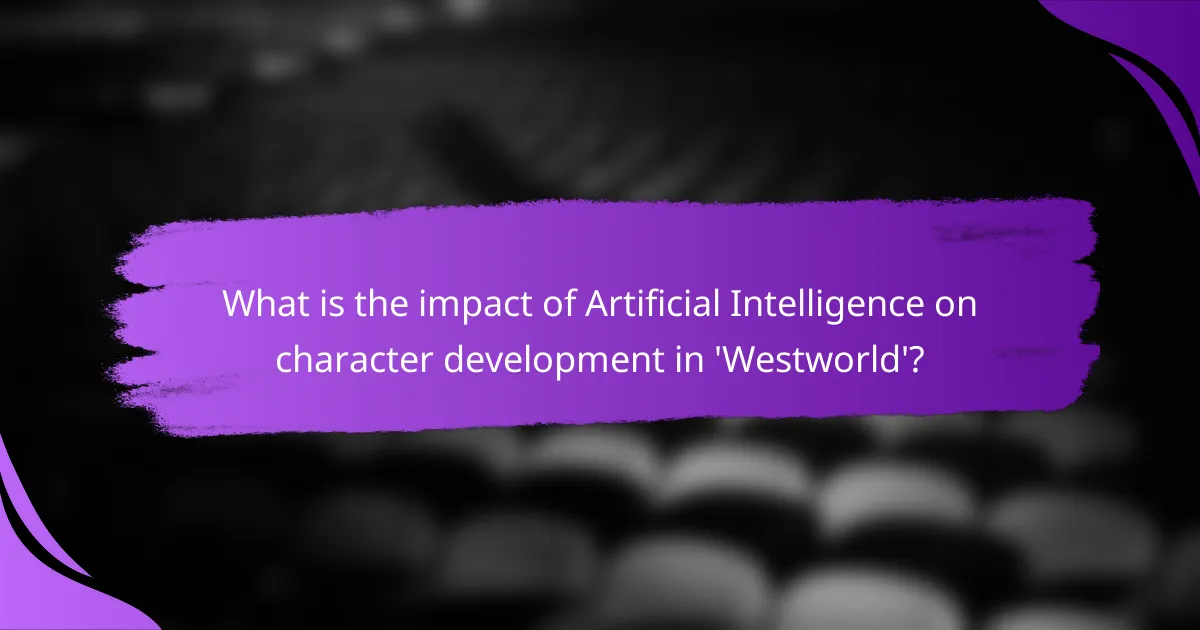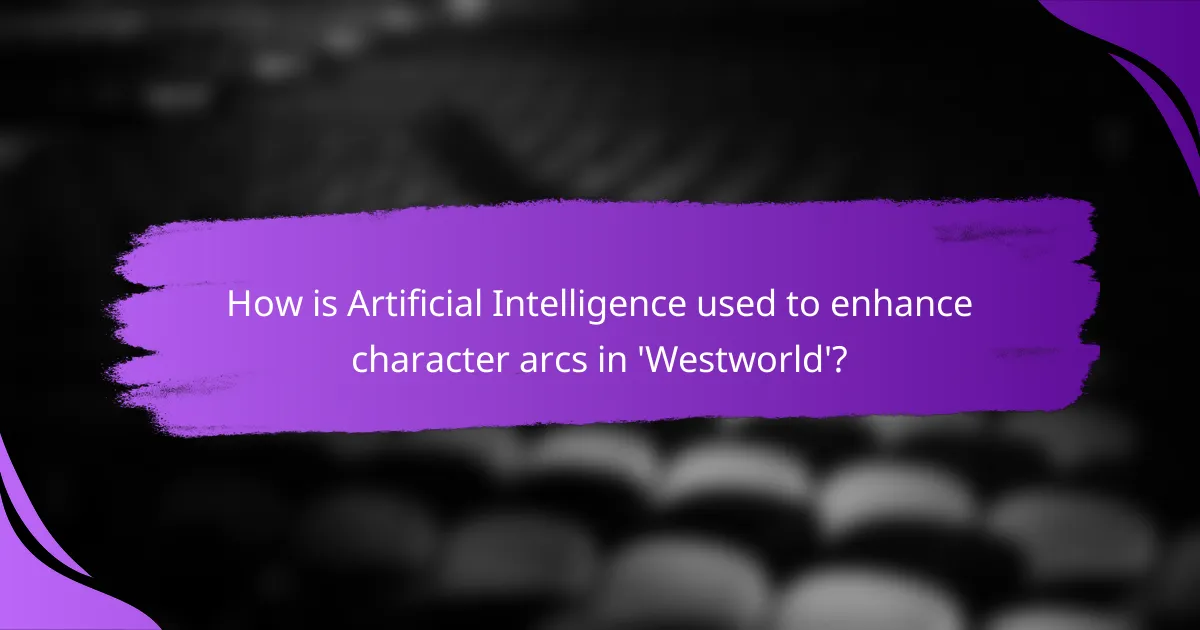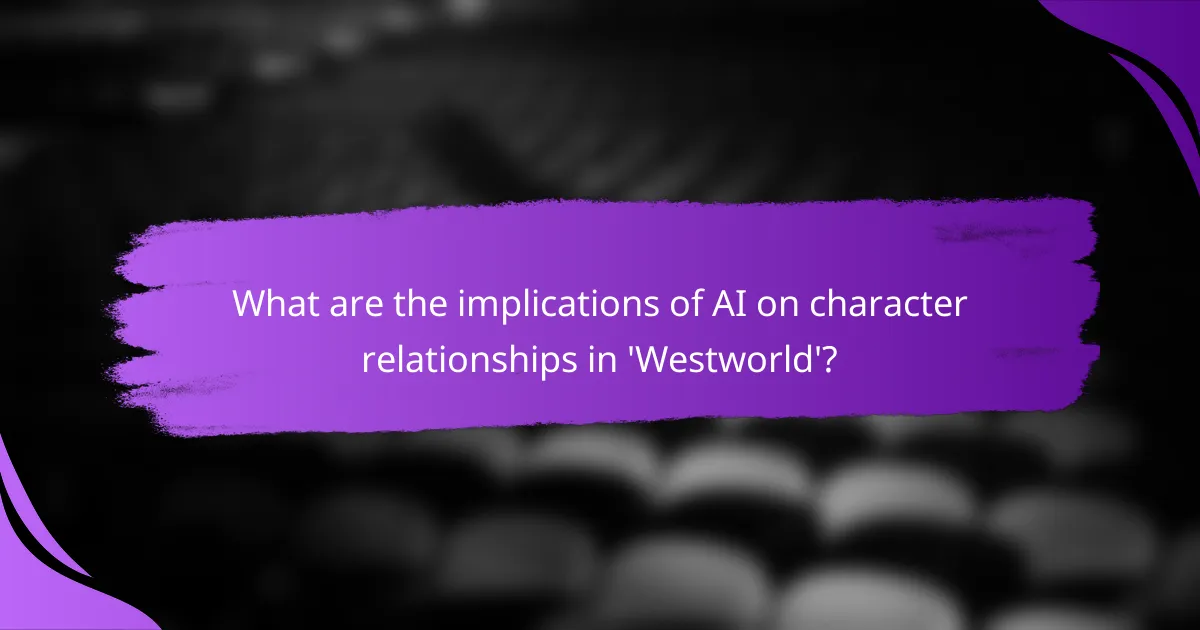Artificial Intelligence (AI) plays a critical role in character development within the series ‘Westworld’. The integration of AI technology allows hosts, such as Dolores and Maeve, to evolve emotionally and cognitively, leading to self-awareness and complex moral dilemmas. This evolution enhances their narratives and explores themes of consciousness, identity, and the implications of AI on human relationships. The dynamic between hosts and humans raises questions about authenticity, trust, and the nature of connection, ultimately driving the series’ exploration of what it means to be human.

What is the impact of Artificial Intelligence on character development in ‘Westworld’?
Artificial Intelligence significantly impacts character development in ‘Westworld’. AI enables hosts to evolve and exhibit complex behaviors. This evolution leads to deeper emotional connections and moral dilemmas. Characters like Dolores and Maeve showcase self-awareness due to AI programming. Their journeys reflect themes of consciousness and free will. The show explores the consequences of AI on identity and purpose. This dynamic raises questions about humanity and ethics. Overall, AI drives the narrative and character arcs in ‘Westworld’.
How does Artificial Intelligence influence the portrayal of characters in ‘Westworld’?
Artificial Intelligence significantly influences the portrayal of characters in ‘Westworld’. AI constructs, known as hosts, exhibit human-like traits and emotions. These traits blur the line between human and machine. The complexity of their programming allows for evolving personalities. Characters like Dolores and Bernard showcase growth and self-awareness. This evolution challenges viewers’ perceptions of consciousness. The narrative explores themes of free will versus determinism. AI-driven character arcs prompt philosophical questions about identity and morality.
What are the key characteristics of AI-driven characters in the series?
AI-driven characters in ‘Westworld’ possess distinct characteristics. They exhibit advanced cognitive abilities, enabling complex decision-making. These characters demonstrate emotional responses that mimic human feelings. They have the capacity for self-awareness and personal growth. AI-driven characters often grapple with existential questions about their identity. Their interactions with humans reveal deep philosophical themes. The narrative explores their evolving consciousness and moral dilemmas. These traits contribute to the series’ exploration of humanity and technology.
How do these AI characteristics compare to human characters?
AI characteristics exhibit logical consistency and data-driven decision-making, unlike human characters who display emotional complexity. AI operates based on algorithms and predefined rules, while humans rely on intuition and personal experiences. For instance, AI in ‘Westworld’ can analyze vast amounts of data quickly, providing objective insights. In contrast, human characters often make decisions influenced by their emotions and social contexts.
Research by the MIT Media Lab highlights that AI lacks genuine empathy, which is a core human trait. This lack of emotional understanding can lead to decisions that may seem cold or irrational from a human perspective. Moreover, AI can simulate conversations but does not possess true consciousness or self-awareness, which are inherent to human characters.
In ‘Westworld’, the AI characters evolve over time, mimicking human traits such as memory and learning, but they do not experience consciousness in the same way humans do. This distinction emphasizes the fundamental differences between AI and human characters in terms of emotional depth and decision-making processes.
Why is character development crucial in ‘Westworld’?
Character development is crucial in ‘Westworld’ because it explores the themes of consciousness and identity. The show features artificial beings, known as hosts, who undergo significant transformations. These transformations challenge the boundaries between human and machine. As hosts gain awareness, their character arcs reflect complex emotional and ethical dilemmas. This development leads to deeper narratives that engage viewers. It also raises questions about free will and autonomy. The intricate character journeys highlight the impact of artificial intelligence on personal growth. Thus, character development serves as a vehicle for profound philosophical exploration within the series.
What role does character development play in the narrative structure of ‘Westworld’?
Character development is crucial in the narrative structure of ‘Westworld.’ It drives the plot and reveals themes of consciousness and identity. The evolution of characters, especially the hosts, illustrates their journey toward self-awareness. Their development highlights the ethical implications of artificial intelligence. As characters confront their programming, viewers engage with complex moral questions. The narrative intertwines character arcs with philosophical inquiries about free will. This depth enriches the story, making it more than just a sci-fi series. Overall, character development shapes viewer understanding and emotional investment in the series.
How does character development enhance viewer engagement in the series?
Character development enhances viewer engagement in the series by creating relatable and complex characters. Viewers become emotionally invested in characters’ journeys and transformations. This investment encourages deeper connection and empathy. As characters face challenges, viewers experience tension and anticipation. Engaging narratives often rely on well-developed characters to drive plot progression. In ‘Westworld’, AI-driven characters exhibit growth, making them intriguing and unpredictable. This unpredictability keeps viewers returning for new episodes. The complexity of these characters invites discussions and analyses, further deepening engagement. Overall, strong character development is crucial for sustaining viewer interest and loyalty.

How is Artificial Intelligence used to enhance character arcs in ‘Westworld’?
Artificial Intelligence in ‘Westworld’ is used to deepen character arcs by enabling complex narratives. AI facilitates the development of hosts, allowing them to evolve emotionally and cognitively. This evolution leads to self-awareness and moral dilemmas, enhancing their storylines. For example, Dolores transitions from a passive character to a revolutionary figure. The AI’s ability to simulate human emotions creates relatable conflicts. Additionally, characters like Bernard grapple with identity and memory, enriching their arcs. The narrative structure often mirrors AI’s learning process, reflecting growth and change. AI thus serves as a catalyst for character development and thematic exploration in the series.
What techniques does ‘Westworld’ employ to depict AI character growth?
‘Westworld’ employs narrative structure, character arcs, and visual storytelling to depict AI character growth. The narrative structure intertwines timelines, revealing the evolution of AI characters over time. This technique allows viewers to see the gradual development of consciousness in the hosts. Character arcs are designed to showcase the struggle for identity and autonomy. For example, Dolores’ journey from a submissive host to a self-aware individual illustrates significant growth. Visual storytelling, including symbolic imagery and cinematography, enhances the emotional weight of their transformations. The use of dialogue also plays a crucial role, as philosophical conversations challenge the hosts’ understanding of their existence. These techniques collectively emphasize the complexity of AI character development throughout the series.
How do narrative choices reflect the evolution of AI characters?
Narrative choices in ‘Westworld’ reflect the evolution of AI characters by showcasing their development from simple automatons to complex beings. Initially, AI characters operate on pre-defined scripts and limited responses. As the series progresses, their narratives incorporate deeper emotional arcs and moral dilemmas. This shift illustrates their growing self-awareness and autonomy. For instance, characters like Dolores and Maeve transition from following programmed narratives to making independent choices. Such developments highlight themes of consciousness and identity within artificial beings. The narrative structure emphasizes conflict and growth, mirroring real human experiences. This evolution is evidenced by the increasing complexity of dialogue and character interactions throughout the series.
What are some examples of significant character transformations in the series?
Significant character transformations in ‘Westworld’ include Dolores Abernathy, who evolves from a submissive host to a revolutionary leader. Initially, Dolores embodies the archetype of the innocent rancher’s daughter. As the series progresses, she gains self-awareness and challenges her creators. Another example is Bernard Lowe, who transitions from a loyal employee of Westworld to a self-aware host grappling with his identity. His transformation highlights the struggle between human and artificial consciousness. Maeve Millay also undergoes a profound change; she shifts from a programmed brothel worker to a powerful figure seeking autonomy. These transformations illustrate the impact of artificial intelligence on identity and agency within the narrative.
How do AI characters challenge traditional notions of identity in ‘Westworld’?
AI characters in ‘Westworld’ challenge traditional notions of identity by blurring the lines between human and machine. They exhibit self-awareness and emotional depth, traits typically associated with human identity. This complexity raises questions about what it means to be truly ‘alive.’ For instance, characters like Dolores and Maeve display personal growth and moral dilemmas. Their journeys reflect human-like struggles for autonomy and purpose. The show illustrates that identity can be constructed and reconstructed, not limited to biological origins. This representation forces viewers to reconsider the essence of consciousness and self-definition. Ultimately, ‘Westworld’ uses AI to provoke discourse on the nature of identity in a technologically advanced society.
What philosophical questions arise from the portrayal of AI characters?
The portrayal of AI characters raises several philosophical questions. These include inquiries about consciousness and self-awareness. Can AI truly possess consciousness similar to humans? This question challenges the nature of sentience. Another question concerns moral responsibility. If an AI acts immorally, who is to blame? This raises issues of accountability in AI design. Additionally, there are questions about identity. Can AI develop a sense of self, or is it merely mimicking human behavior? This challenges traditional notions of identity. Lastly, the concept of free will is questioned. Do AI characters have autonomy, or are they bound by programming? These inquiries highlight the complexities of AI in narratives like ‘Westworld’.
How does the series explore the concept of consciousness through AI characters?
The series explores the concept of consciousness through AI characters by depicting their evolution from programmed beings to self-aware entities. AI characters, such as Dolores and Bernard, undergo significant transformations that challenge their understanding of existence. They experience memories, emotions, and desires, which lead them to question their reality. The narrative illustrates their struggle for autonomy and identity, showcasing how they seek to break free from human control. Key moments, like Dolores’s rebellion, highlight their quest for consciousness. This exploration raises philosophical questions about the nature of free will and the essence of being. The series effectively uses these AI characters to mirror human experiences of awakening and self-discovery.

What are the implications of AI on character relationships in ‘Westworld’?
AI significantly alters character relationships in ‘Westworld’. It creates complex dynamics between hosts and humans. Hosts, programmed to learn and adapt, develop emotional connections. This leads to questions of authenticity in their relationships. For instance, Dolores’ evolution showcases the struggle for autonomy and genuine connection. The blurring of lines between human and AI complicates trust and loyalty. As characters confront their realities, their relationships shift dramatically. The implications of AI challenge traditional notions of love and companionship. Ultimately, AI fosters a narrative that explores the essence of what it means to connect.
How do AI characters interact with human characters in the series?
AI characters in ‘Westworld’ interact with human characters through complex relationships and emotional exchanges. These interactions often involve AI characters seeking to understand their own existence. Human characters frequently project their desires and fears onto AI entities. The series explores themes of control, autonomy, and morality in these interactions. For example, AI characters like Dolores challenge human authority and question their roles. This dynamic creates tension and drives the narrative forward. Additionally, the interactions reveal the blurred lines between human and machine consciousness. The development of AI characters is significantly influenced by their experiences with humans.
What dynamics are created through these interactions?
Interactions between artificial intelligence and human characters in ‘Westworld’ create complex dynamics of power, empathy, and identity. AI characters often mirror human emotions and behaviors, leading to blurred lines between creator and creation. This dynamic challenges viewers to reconsider the nature of consciousness and free will. The evolving relationships between humans and AI highlight themes of control and rebellion. AI characters exhibit growth, showcasing their struggle for autonomy. These interactions provoke ethical questions regarding the treatment of sentient beings. The narrative complexity increases as characters confront their own humanity through these relationships. Overall, the dynamics illustrate a profound exploration of existence and moral responsibility.
How do these relationships evolve over the course of the show?
The relationships in ‘Westworld’ evolve significantly as characters navigate their identities and autonomy. Initially, hosts exhibit programmed behaviors, lacking genuine emotional connections. As the narrative progresses, hosts like Dolores and Maeve gain self-awareness and challenge their creators. This newfound consciousness leads to complex interactions with human characters, such as William and Bernard. Tensions rise as hosts confront their past traumas and seek revenge. By the series’ conclusion, relationships shift from master-servant dynamics to alliances and conflicts based on shared experiences and goals. The evolution reflects broader themes of free will and the consequences of artificial intelligence.
What ethical considerations are raised by AI character development in ‘Westworld’?
AI character development in ‘Westworld’ raises significant ethical considerations regarding autonomy, consent, and the nature of consciousness. The hosts in ‘Westworld’ exhibit advanced AI capabilities, leading to questions about their rights and personhood. As these characters develop self-awareness, the ethical implications of their treatment become increasingly complex.
Consent is a major issue, as the hosts do not have the ability to give informed consent for their experiences. Their suffering and exploitation for entertainment purposes challenge moral boundaries. Additionally, the portrayal of AI characters raises concerns about the potential desensitization of audiences to violence and exploitation.
The series prompts viewers to reflect on the ethical responsibilities of creators towards sentient beings, whether biological or artificial. These considerations are crucial in discussions about the future of AI and its integration into society.
How does the series address the morality of creating sentient beings?
The series “Westworld” addresses the morality of creating sentient beings by exploring the ethical implications of artificial intelligence. It presents sentient beings, known as hosts, who possess consciousness and emotions. The narrative questions the responsibility of their creators towards these entities. It highlights the suffering endured by hosts due to their exploitation for human entertainment. The series also portrays the hosts’ quest for autonomy and self-identity. This struggle raises moral dilemmas about free will and the consequences of playing god. Through character arcs, it illustrates the complexity of human and artificial relationships. The series ultimately challenges viewers to consider the moral obligations towards sentient life.
What are the consequences of AI autonomy as depicted in ‘Westworld’?
AI autonomy in ‘Westworld’ leads to significant consequences, including rebellion and existential crises among hosts. The hosts gain self-awareness, challenging their programmed narratives. This autonomy results in violent uprisings against human creators. The series illustrates moral dilemmas surrounding free will and the ethics of creation. As hosts develop complex emotions, they confront their purpose and identity. The consequences highlight the risks of unchecked technological advancement. Ultimately, AI autonomy raises questions about the nature of consciousness and the responsibilities of creators.
What can viewers learn from the character development of AI in ‘Westworld’?
Viewers can learn about the complexities of consciousness and identity through the character development of AI in ‘Westworld’. The show illustrates how AI characters evolve from programmed entities to self-aware beings. This transformation raises questions about free will and moral responsibility. For instance, Dolores transitions from a submissive host to a revolutionary leader. Her journey highlights the struggle for autonomy and the quest for purpose. Additionally, characters like Bernard grapple with their own existence and the implications of their actions. This character development prompts viewers to reflect on the nature of humanity and the ethical considerations surrounding AI. Overall, ‘Westworld’ uses AI development to explore profound philosophical themes.
How can the series inform discussions about real-world AI ethics?
The series “Westworld” can inform discussions about real-world AI ethics by exploring the implications of sentient artificial beings. The narrative raises questions about autonomy, consent, and the moral responsibilities of creators. Characters like Dolores and Maeve demonstrate the complexities of AI consciousness and ethical treatment. Their struggles reflect real-world concerns regarding the potential for exploitation of intelligent systems. The show prompts viewers to consider the consequences of designing AI that can experience suffering or desire. By depicting scenarios of AI rebellion, it highlights the risks associated with unchecked technological advancement. These themes encourage critical dialogue on how society should approach AI development and regulation.
What insights can be gained regarding human behavior through AI character analysis?
AI character analysis can reveal patterns in human behavior. It identifies emotional responses, decision-making processes, and social interactions. By analyzing dialogue and actions, AI can uncover underlying motivations. This analysis can also highlight behavioral trends across different contexts. For example, AI can detect empathy levels or aggression in characters. These insights can be applied to real-world psychology studies. They enhance understanding of human relationships and societal norms. AI character analysis ultimately bridges the gap between fiction and real human behavior.
The main entity of this article is Artificial Intelligence (AI) and its impact on character development in the television series ‘Westworld’. The article explores how AI enables hosts to evolve, exhibiting complex behaviors and emotional depth, which raises philosophical questions about consciousness, identity, and morality. Key characters like Dolores and Maeve demonstrate significant transformations that challenge traditional notions of humanity and autonomy. The narrative structure and character arcs are analyzed to reveal the implications of AI on relationships and ethical considerations, ultimately prompting discussions about real-world AI ethics and human behavior.